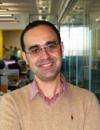Abdenour Soufi

Contact details
- Tel: 0131 651 9500
- Email: Abdenour.Soufi@ed.ac.uk
Address
- Street
-
Centre for Regenerative Medicine,
Institute for Regeneration and Repair,
The University of Edinburgh,
Edinburgh BioQuarter,
5 Little France Drive, - City
- Edinburgh
- Post code
- EH16 4UU
Background
2015: Group leader, Chancellor’s fellow, MRC Centre for Regenerative Medicine, University of Edinburgh, UK
2010-2014: Postdoc, Prof Ken Zaret lab, Cell and Development Biology Department, Institute for Regenerative Medicine, University of Pennsylvania, US
2007-2009: Postdoc, Dr Sheela Jayaraman lab, School of Immunity and Infection, University of Birmingham, UK
2002-2006: PhD, Dr Kevin Gaston and Dr Sheela Jayaraman labs, Department of Biochemistry, University of Bristol, UK
2002: BSc in Biochemistry and Biotechnology, University of Bristol, UK
Open to PhD supervision enquiries?
Yes
Current PhD students supervised
Katharine Furlong
Ivana Gachulincová
Asier Galarza Torre
Michael O'Dwyer
Research summary
Chromatin structure and cellular identity
The ability to convert any human cell to other specialised cell types of the body will allow the regeneration of tissues and organs as well as develop personalised therapies. It is now possible to reprogram biopsied human cells to become induced pluripotent stem (iPS) cells, which are very similar to embryonic stem (ES) cells. These cells are pluripotent and can potentially give rise to all cell types of the body. However, this cellular reprogramming method is highly inefficient and relies on the genetic manipulation of factors that have been associated with tumours. We aim to design reprogramming factors that are efficient and safe to use in the clinic.
Aims and areas of interest
Our ultimate goal is to design synthetic factors that can convert any cell in the body to a specific cell type of interest. We aim to learn from how the naturally occurring reprogramming factors interact with the genome and other molecules in the cell to change cell types.
We are particularly interested in how the reprogramming factors Oct4, Sox2, Klf4, and c-Myc (OSKM) convert fibroblasts to iPS cells. We found that the OSKM factors interact with genome in fibroblasts differently from that in ES cells. We also found that OSKM are initially blocked from accessing large chunks of the fibroblast genome, which are needed for complete reprogramming. Based on these abilities and limitations of the OSKM factors, we are currently establishing new approaches to produce custom-made reprogramming factors in the lab.
- University of Edinburgh, School of Biological Sciences, Chancellor's Fellowship
- MRC Career Development Award
- Darwin Trust of Edinburgh PhD Studentship
- BBSRC/eastbio PhD Studentship
- BBSRC/EPSRC/MRC Synthetic Biological Research Centre
- Diabetes Research & Wellness Foundationhttps://www.ed.ac.uk/human-resources/jobs/chancellors-fellowships
- Mexico CONACYT PhD Studentship
- Professor Ian Chambers, University of Edinburgh
- Professor Keisuke Kaji, University of Edinburgh
- Professor Susan Rosser, The Edinburgh Mammalian Synthetic Biology Research Centre
- Professor Yossef Buganim, The Hebrew University of Jerusalem
- Professor Michael G. Poirier, The Ohio State University
- Professor Kevin Docherty, University of Aberdeen
- Professor Hans R. Scholer, Max Planck Institute for Molecular Biomedicine, Munster, Germany
- Professor Ralf Jauch, Guangzhou Institute of Biomedicine and Health, China
- Professor Martin Taylor, IGMM, University of Edinburgh
